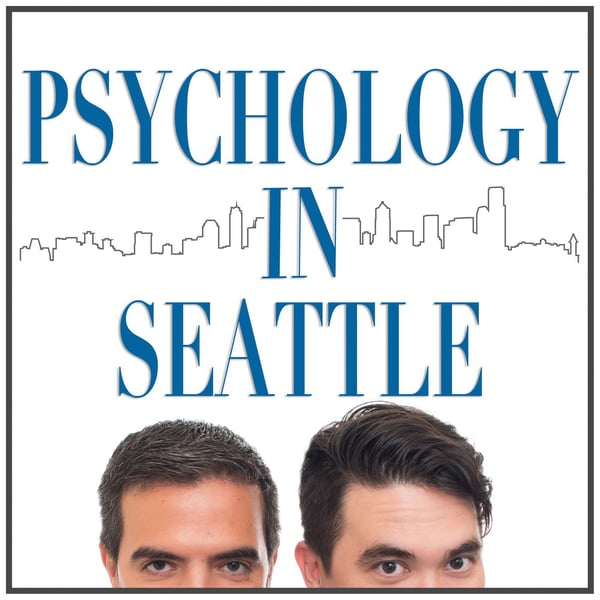When Clients are Dangerous (2017 Rerun)
Psychology In Seattle Podcast
Kirk Honda
4.6 • 1.2K Ratings
🗓️ 26 June 2022
⏱️ 5 minutes
🧾️ Download transcript
Summary
The full episode is available to patrons of the podcast.
Become a patron: https://www.patreon.com/PsychologyInSeattle
Email: https://www.psychologyinseattle.com/contact
Merch: https://teespring.com/stores/psychology-in-seattle
Cameo: https://www.cameo.com/kirkhonda
Instagram: https://www.instagram.com/psychologyinseattle/
Discord: https://discord.gg/6QR4sE8x9K
Reddit (run by fans): https://www.reddit.com/r/PsychologyInSeattle/
Twitter: https://twitter.com/PsychInSeattle
Facebook Official Page: https://www.facebook.com/PsychologyInSeattle/
Facebook Fan Page (run by fans): https://www.facebook.com/groups/112633189213033
TikTok: https://www.tiktok.com/@kirk.honda
The Psychology In Seattle Podcast ®
Trigger Warning: This episode may include topics such as assault, trauma, and discrimination. If necessary, listeners are encouraged to refrain from listening and care for their safety and well-being.
Disclaimer: The content provided is for educational, informational, and entertainment purposes only. Nothing here constitutes personal or professional consultation, therapy, diagnosis, or creates a counselor-client relationship. Topics discussed may generate differing points of view. If you participate (by being a guest, submitting a question, or commenting) you must do so with the knowledge that we cannot control reactions or responses from others, which may not agree with you or feel unfair. Your participation on this site is at your own risk, accepting full responsibility for any liability or harm that may result. Anything you write here may be used for discussion or endorsement of the podcast. Opinions and views expressed by the host and guest hosts are personal views. Although, we take precautions and fact check, they should not be considered facts and the opinions may change. Opinions posted by participants (such as comments) are not those of the hosts. Readers should not rely on any information found here and should perform due diligence before taking any action. For a more extensive description of factors for you to consider, please see www.psychologyinseattle.com
This show is part of the Spreaker Prime Network, if you are interested in advertising on this podcast, contact us at https://www.spreaker.com/show/3269717/advertisement
Transcript
Click on a timestamp to play from that location
| 0:00.0 | Hey, deserving listeners. It's just me today. Today, I need to give an update about the |
| 0:13.5 | whole tariff soft duty to warn thing. I've learned a lot of stuff recently. I've consulted |
| 0:20.7 | with some some experts on this. I did an episode in which I talked about how our duty to |
| 0:28.6 | warn requirements have changed recently due to some recent case law in Washington state. |
| 0:37.8 | And I think it affects people in other states too. And in that episode, I was talking about |
| 0:45.3 | how these case law situations were completely screwing up our duty to warn and making us |
| 0:51.6 | have to report all sorts of stuff. And it was ridiculous. And so after talking and consulting |
| 1:00.5 | with some experts on this, I understand it much better now. And so I want to talk about |
| 1:08.6 | that today partially to disseminate the information, but also partially because it helps me to |
| 1:15.3 | understand this better when I actually make an episode about it. So today, I'm going to |
| 1:19.5 | talk fully about tariff soft. I finally just sat down as, okay, I need to actually learn the |
| 1:25.2 | whole tariff soft story. For those of you outside of psychotherapy, you're like, what are you |
| 1:30.8 | talking about? This is basically about therapists requirement that they protect the public from |
| 1:39.0 | their clients. So if they have a client who is dangerous, what do they do? Because therapists |
| 1:45.2 | are supposed to uphold confidentiality, right? Well, there are times when we are supposed to |
| 1:50.2 | violate that confidentiality to protect other people if our client was threatening to kill someone |
| 1:56.9 | or something. Well, I and many of my colleagues used to have a very simple understanding of |
| 2:03.4 | this whole thing because there was a very simple guideline that we followed that we called |
| 2:08.6 | tariff soft. But recently, particularly in a Washington state, there's been a case law where judges |
| 2:17.1 | and courts and Supreme courts have ruled in such a way that they're like, well, yeah, sure, |
| 2:22.0 | tariff soft is great, but there are other situations in which you also have to report in which, |
| 2:27.1 | and if you don't, you'll be found negligent and liable. And so, so anyway, today I'm going |
... |
Please login to see the full transcript.
Disclaimer: The podcast and artwork embedded on this page are from Kirk Honda, and are the property of its owner and not affiliated with or endorsed by Tapesearch.
Generated transcripts are the property of Kirk Honda and are distributed freely under the Fair Use doctrine. Transcripts generated by Tapesearch are not guaranteed to be accurate.
Copyright © Tapesearch 2025.

